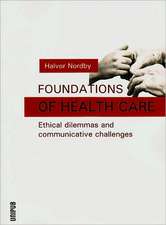The Ethics of Managed Care – A Pragmatic Approach
Autor Mary R. Majumderen Limba Engleză Hardback – 26 iul 2001
In this account, "pragmatic" suggests practical idealism, not the jettisoning of principle in the interests of expediency. Anderlik favors a broad empiricism and a moral vision centred on values of democracy and community. It follows that an important aspect of the evaluation of organisations is an assessment of their effects on the quality of social relationships. Anderlik describes how organisations can nourish or destroy human potentialities for openness, creativity, cooperation, and faithfulness and display "virtues" such as justice, integrity, responsiveness, and efficiency rightly understood. A case study illustrates the potential for realisation of significant individual and communal goods within managed care organisations as well as the dangers and difficulties that bedevil even the best of them.
Anderlik uses community care clinics, asthma outreach programs, and new contexts for participatory decision-making to show the promise of managed care. She also explains the complexities of financial arrangements, arguing for an end to schemes that reward clinicians for providing less care and make it profitable to avoid people who need a lot of care. She finds that other practices, such as use of guidelines or gatekeepers, require a more subtle analysis. Guidelines as best practice advisories and one tool for quality improvement are contrasted with guidelines as rules for saving money purporting to be best practice advisories or objects of faith. Gatekeepers as mentors, coordinators, judicious users of services and points of accountability are distinguished from gatekeepers as stern enforcers of "autonomous" choice and indifferent obstructionists. The book concludes with a look at the future of managed care, outlining a positive program for reform.
Preț: 365.59 lei
Nou
Puncte Express: 548
Preț estimativ în valută:
69.96€ • 73.38$ • 58.24£
69.96€ • 73.38$ • 58.24£
Carte tipărită la comandă
Livrare economică 01-15 aprilie
Preluare comenzi: 021 569.72.76
Specificații
ISBN-13: 9780253338488
ISBN-10: 0253338484
Pagini: 312
Dimensiuni: 197 x 241 x 28 mm
Greutate: 0.67 kg
Ediția:Indiana Univ PR.
Editura: MH – Indiana University Press
ISBN-10: 0253338484
Pagini: 312
Dimensiuni: 197 x 241 x 28 mm
Greutate: 0.67 kg
Ediția:Indiana Univ PR.
Editura: MH – Indiana University Press
Cuprins
Table of Contents:
Introduction
1. Managed Care as Social Experiment and Social Problem
2. Managed Care and the Medicine-Business Polemic
3. An Ethic for an Age of Organisations
4. Kaiser Permanente: An Organisational Character Study
5. The Market, Professionalism, and Co-operative Egalitarianism in Health Care
6. Making Sense of Managed Care
Conclusion: The Future of Managed Care
Introduction
1. Managed Care as Social Experiment and Social Problem
2. Managed Care and the Medicine-Business Polemic
3. An Ethic for an Age of Organisations
4. Kaiser Permanente: An Organisational Character Study
5. The Market, Professionalism, and Co-operative Egalitarianism in Health Care
6. Making Sense of Managed Care
Conclusion: The Future of Managed Care
Recenzii
Anderlik (Univ. of Houston Law Center) argues that managed care has by default become society's medical care rationing agent. She decries this role and points to Kaiser Permanente as a managed care organization that has both social conscience and genuine concern for its enrollees. Anderlik posits that organizations can and should nourish human personalities and display virtues such as justice, integrity, responsiveness, and efficiency. The pervasiveness of financial incentives to save health care money is, the author believes, at the center of the problem. This work is an exploration of the care giving in today's managed care setting, from the perspective of an ethical position that managed care organizations are not meeting ethical obligations to their enrollees. The book is well footnoted and well reasoned, but readers will have to accept the ethical assertions made by the author. All levels.J. E. Allen, University of North Carolina at Chapel Hill, 2002apr CHOICE.--J. E. Allen, University of North Carolina at Chapel Hill, 2002apr CHOICE.
Descriere
This breakthrough reappraisal of the managed healthcare debate between medicine and business describes how organizations can nourish or destroy openness, creativity, cooperation, and faithfulness. The author explains the complexities of financial arrangements, arguing for an end to schemes that reward clinicians for providing less care and profiting from avoiding people who need it.

















